A Golden Chain: Writing in Form
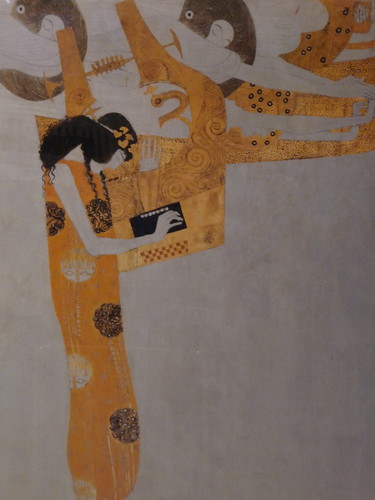
Last week, over at High Calling Blogs, I went on about poetry and elitism— saying (are you surprised?) that we need more room in this world for word celebration. In response, Megan Willome dropped a marvelous poem in the comment box, about how teachers can kill our love of poetry with too much emphasis on form. This reminded me of a T.S. Eliot class I took at NYU; I thought I'd never recover from the relentless focus on every sound, symbol, line break and pattern.
But if you know anything about me, you understand that I love to quibble with myself. So even though I offered the prompt 'I look at you, as if for the first time...' (see the HCB post for more details), I didn't take myself up on it. Instead, I decided to confront my distaste for writing in form and prove that it doesn't have to derail beauty or mercilessly constrain a poet.
Using The Making of a Poem, I read about a form called the 'villanelle.' I thought it was interesting that the authors said this form prevents the telling of a story, because of the way it uses repetition (notice how line 1 is repeated at the end of every other stanza and line 3 is also repeated and then both are repeated as a pair at the end of the poem).
Also, there's a rhyming pattern that switches back and forth. Poets call that aba. Don't worry about it. Just be a detective and find the rhymes yourself; it's more fun that way. Notice that there are 5 stanzas of 3 lines and the 6th has 4 lines. Who comes up with this stuff? Well, apparently Italian farmers had a lot on their minds when they made up songs in the fields, because that is how the villanelle was born.
Here's my go at one, dedicated to a friend who is currently traveling in Sudan.
'A Song of Sudan'
You travel past equator 'til
the sand whips over day
and night descends quite still.
Cloth veils the face of women ill
and well (you cannot say);
you travel past equator 'til
the Nile snakes its shrill
regret of war, while battle is at bay
and night descends quite still.
By morning, sun begins to stalk and fill
the cracks of every hiding place
you travel past equator 'til
deep griefs unravel will
to rebuild shattered clay
and night descends quite still.
An ibis eyes you, dips her beak to kill
some silver flash like bullet play
you travel past equator 'til
the night descends quite still.
(This poem was later published in InsideOut: Poems, International Arts Movement, 2009.)
Gustav Klimt's Lady Poetry, photo by J Barkat. Used with permission.
MORE POETRY:
LL's daughter's The Garden Still, two villanelles and a sestina
Labels: high calling blogs, how to write a poem, poetry, random acts of poetry, Sudan, Villanelle
![Reblog this post [with Zemanta]](http://img.zemanta.com/reblog_e.png?x-id=ee6abef8-8b96-423b-8fb0-12b19f8dcfa1)



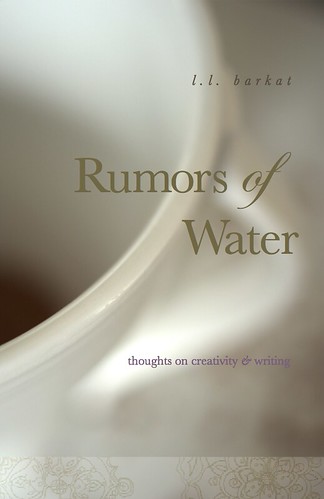
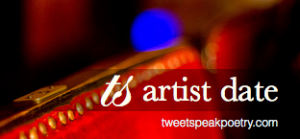

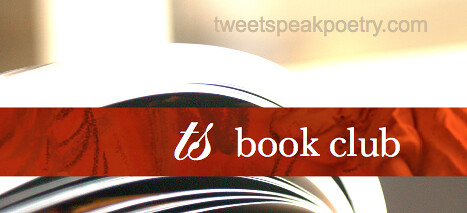
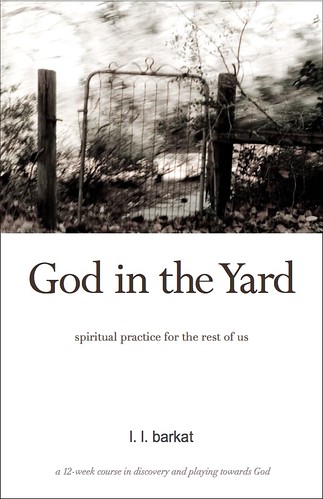







18 Comments:
what a tuff assignment you have laid out! i may partake; yet, i will have to return and digest a little more to make sure i get the instructions correct :0)
LL,
Love it! Form can be incredibly creative.
I wanted to tell you about a poetry challenge that my 16 year old son gave himself. He took National Poetry Month very seriously and decided to write a poem a day. They are posted on his blog. You might find them interesting. I was just thrilled that he set himself to the task and pressed on til complete. So much revealed in this writing. He's onto something and I can't wait to see what else he does with his artistic, poetic sense.
Here's the link to April's poems:http://notanotherapathy.blogspot.com/2009_04_01_archive.html
I'm always astounded at how form effects tone and vice-versa, and I thought of that again as I read your poem here. I can't help but wonder if such a topic would produce a different feeling with a different form, which seems so cool to me.
it reminds me of how life seems to go in a spiral where things just keep popping up over and over again through time as i travel around the curves.
I think the repetition enhances the story in this poem. It has an eerie sort of feel to me.
But, my! I am the one scratching my head at how to achieve such artistry. Perhaps I'll leave these complexities to the champs such as yourself. Maybe I'll head over to HCB to read more about your other prompt...
Here is my go at it L.L. - loved the challenge, involving twist and turen - makes one use the brain -
Ying and Yang
Old man sits at Chinese table
eyes processing lantern light
ancient words read as fable.
Mourning dress requires sable
rest setting upon a house
old man sits at Chinese table.
Once young woman soft, able
eyes reflecting morning light
ancient words read as fable.
Structured roof, with sloping gable
stretches out to garden walk
old man sits at Chinese table.
Garden lost, life balance unstable
death captures the midday light
ancient words read as a fable.
Ying separate, Yang unable
darkness gathers up his light
old man sits at Chinese table
ancient words read as fable.
bkmackenzie
well - I have to say that it doesn't sound like a place I want to visit!!
thanks for stopping by - one of the quiet and unusual places I come to "hear" is here.
Great post!Blessings~Sharon
I think I like both: form, no form. Sometimes what you're trying to say gives itself form and you find yourself repeating lines, or rhythms even though it wasn't part of the plan, but it is part of the reliving of the experience, of making room for it. I am not very good at following forms. I play with them or poke fun at them, or give them a bit of play then ignore them, or am totally ignorant of them. Not very good at all with following forms. I think it is more like following a recipe then finding you're missing half the ingredients, but it's okay, still tastes good. Just different. Not what you were expecting, but good.
I loved your twitter poem. This one as well. Delighted to be here.
Wow! You leave me speechless, in awe! I feel awfully lazy, taking the easy way out with my "formless" poetry. But I do enjoy challenging word games that require precision and creativity (like Scrabble, crosswords, and a fun story game from Grammar Punk that I'm dying to play with some writerly people).
Oh, I am impressed. Your gift for 'mood' in a poem takes on a beautiful angled clarity when used within a form like this.
I'm a fan of formal poetry to begin with. It's true that form can stifle poetry, but learning to use the form to help you is a delightful skill. Poetically speaking, you might relate it to the way you can work with the restrictions on your life to create something beautiful, rather than being stifled by them.
You can use form as something to push against; fighting the restrictions of a form can also create interesting poetry. Or you can use the form to distract your conscious mind and allow your unconscious thoughts to filter through. And so on.
I was so taken with the Klimt image that I had a hard time setting my monkey mind around the poetry form. I'm not up for the poetry challenge tonight but again, thanks for the lovely Klimt!
Lynet's comment on form being something you push against. That is the thing about form that I do like. It draws something out of you. It is like wrestling.
OK, here's one on "for the first time" prompt:
http://mybigthree.highcallingblogs.com/2009/05/06/her-hands
Next time I'll try the villanelle. Probably. (And how far *do* you think you can stretch my poor little brain, anyway? Without it snapping?)
:) Thanks for the stretch.
LL, I'm so excited! I did it! I took your challange and wrote a villanelle for my RAP offering! Thanks for throwing down the gauntlet - I was finally able to pick it up! :0)
don't know if it is best to offer my poem here. I couldn't get a comment sent to the HCB site. I chose to follow the suprise prompt.
thx
Wow! That was tough. Really tough! You manage so well to capture mood and spirit in yours, mine sort of rings sing-song-y. But I did try! And Soulintention...wow, that's really beautiful!
So I started writing free verse and then felt inspired to turn it into villanelle. I think I like the free verse version better, but I had fun anyway....
Post a Comment
<< Home